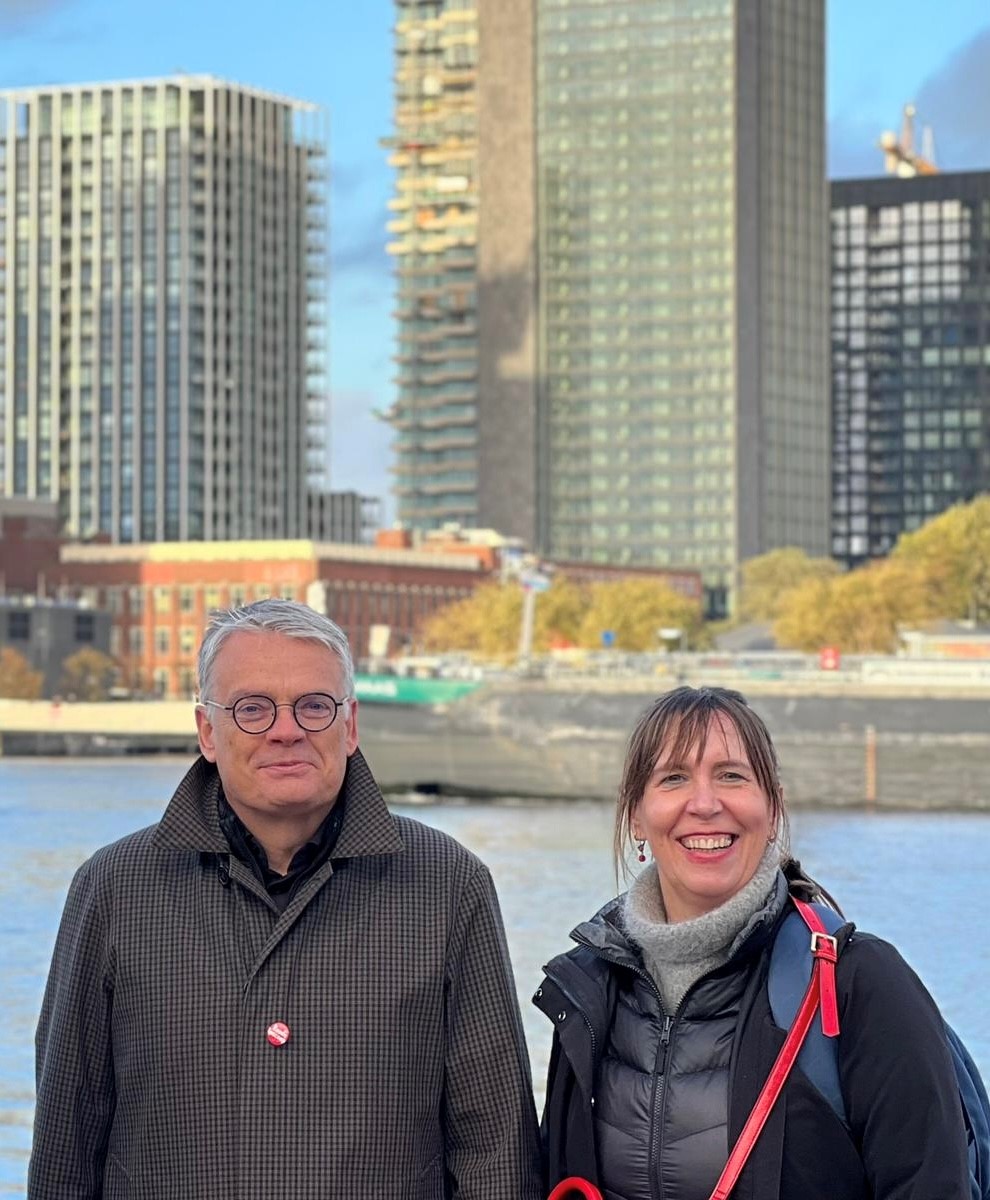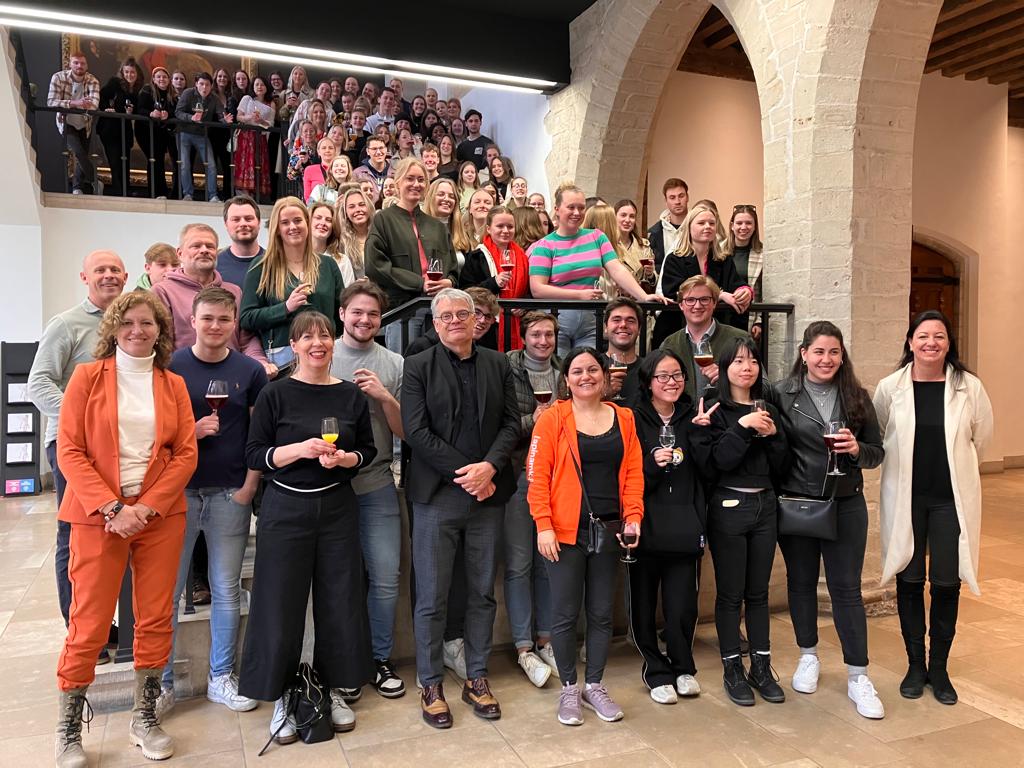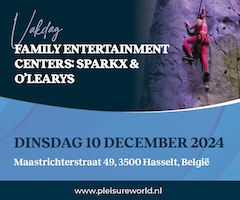STRETCH ideas, visions, exchange and international projects
A long-term international collaboration between event programmes

A few years ago, VIVES University of Applied Sciences in Kortrijk, Belgium, took the initiative to start a collaboration with different universities from all over Europe. The Events for Business specialisation from Academy for Leisure & Events teamed up with them. It all started with a conference by VIVES in which lecturers at universities of Lapland, Germany, Finland, Scotland, Belgium and the Netherlands participated. This article tells the story of the start, the driving forces and the future of this wonderful experience: hiccups, success factors, but above all, becoming a team of international teachers who facilitate the exceptional intercultural learning process of students and lecturers from participating universities.
Dorothé Gerritsen is lecturer of Event Management at Academy for Leisure & Events.
It all started with one question Bart Derolez (programme leader of Event Studies at VIVES) asked: How can we create a more structured international educational process for students of Event Management? They set an ambition to get Event Management students from different countries in contact together by offering international activities, such as student study trips abroad, which are less educational and make students become active participants. Looking for a solid fundament for a more structured way of working together with students who are driven by events, Bart started to think about a project, where relevant (event) content is added, in which students needed to be in charge and get to work themselves. Away from the trips to a foreign country in a passive way.
Start of a network
VIVES started working on a network of events educational programmes. But these were not easy to find. Colleague An van Ostyn from VIVES (senior lecturer of Business English) teamed up to make this project happen. Contacting like-minded event colleagues was difficult. Through websites it was easy to find international offices, but the connection towards events programmes was not easily found. Therefore they decided to send a call for an international conference for lecturers from Event Management programmes in different European countries. Preparations started in 2019. But when the conference was due to start in March 2020, the coronavirus appeared. A week before, the 20 lecturers from Germany, Denmark, Edinburgh, Glasgow (University of West Scotland), and the Netherlands who signed up for the conference needed to be cancelled. But in 2021 the conference could take place online (due to corona issues still). During the conference, each participating lecturer presented their own programme about events education. The differences between the universities were huge. It was a big challenge to find similarities in order to see where and when universities could team up. In 2022, the first physical real-life conference meetings finally took place in Kortrijk, Bruges, and Brussels.

Bart Derolez and An Ostyn
Connection to SDGs
An van Ostyn attended a session delivered by a UN representative on the importance of integrating the SDGs into education. In the city of Kortrijk, VIVES signalled their commitment to working on the SDGs. As a result, they connected with Durf 2030! (durf2030.eu), a collaboration of different stakeholders in Kortrijk to look for an opportunity to become European Capital of Culture in 2030. These developments put the collaboration project of event programmes on the path to articulate their mission in connection to the SDGs. During the first three-day conference in 2022 the network of event lecturers discussed future opportunities, worked on concepts and visited event locations. The inspiration drawn from companies, such as the event agency Meet Marcel in Bruges and Concertgebouw Kortrijk, and the performance Clay Dance at the Bruges Royal City Theatre by the dance group Ultima Vez choreographed by the famous Belgian choreographer Wim Vandekeybus had its effect. At the AB concert hall in Brussels the idea for a more long-term international collaboration was explored in more detail. Rutger Boxhoorn (lecturer at InHolland) took to the task of drawing up a time schedule and everything fell into place. Afterwards, Bart and An from VIVES, Rutger from InHolland, and Ronald van Olderen and I from BUas worked out all the details.
What makes it tick?
Meeting in real life and especially humour are key success factors for becoming a team. The differences between the cultures are sometimes funny and at the same time inspirational as well. It started with that first question Bart asked about how to make the international collaboration more structured, it was very cool to see all the events prepared by more than 100 students at the first edition of the SDG Action Festival, which was one of the outcomes of the long-term cooperation between universities (see text box). It was touching to see all students and lecturers from universities in Belgium, Finland or the Netherlands working together in 15 international teams again at the Finland edition in 2024. Our drive was to expand the international contacts by an international project with likewise event programmes. When you do not let limitations guide you, think in terms of opportunities, and go beyond bureaucracy, you can succeed, even when the situation is challenging (coronavirus).
SDG Action Festival
STRETCH organises the annual SDG Action Festival, with each partner university taking turns to host it in their own city. The first time ViVES did this in Kortrijk, Belgium in 2023. The second edition took place in Helsinki in 2024. In 2025 Breda will be the host city and BUas will be the host.
The student teams work together on their projects from February to April online. Then they meet in real life for one week and execute their concepts for their pop-up events in the host city for different NGOs within the context of the Sustainable Development Goals of the UN. This intense and interesting programme resulted in the concrete project of collaboration with about 120 students from the different universities. This international project is subsidised by the European Union. The objectives are improving the students’ international competences, more specifically their commitment to global engagement, and improving students’ individual cultural, organisational, project management and communication skills.
The mission of the project is "to improve Kortrijk, Helsinki, Breda, Lapland, Tornio, Lisbon, Estoril, Rotterdam socially and make its citizens aware of potential improvement initiatives via live communication concepts.”
The host cities start to prepare the project and connect the stakeholders in their university, in the city, and companies and organisations connected to the SDGs. Students are appointed to international teams with coaches from one of the partner universities and attend five online education days, each of them hosted by one of the five partner universities. Just think of workshops on Event Design, Concepting and Production. Besides, they get information, documents and videos and meet in online break-out rooms and have the opportunity to meet the client they are working for. Clients are global non-governmental organisations, such as Amnesty International, Oxfam Novib, Unicef, but also local organisations are involved. Students connect their live event to one of the Sustainable Development Goals of the UN. They need to develop a concept for an event for target groups in the city.
The project is funded by Blended Intensive Project (BIP) from the European Union.
Collaboration partners
- Heidi Vähänikkilä and Kaija Merilainen (Laurea University of Applied Sciences)
- Teresa Chen and Marika Saranne (Lapin AMK University of Applied Sciences)
- An Ostyn and Bart Derolez (VIVES University of Applied Sciences)
- Ronald van Olderen, Dorothé Gerritsen and Rowdy van den Nieuwenhuizen (Breda University of Applied Sciences)
- Rutger Boxhoorn, Jan Timmerhuis, David Winter, Michiel Dijkstra (InHolland University of Applied Sciences)
- Susana Filipa Gonçalves (Escola Superior de Hotelaria e Turismo do Estoril)
The future of STRETCH and SDG action festival
STRETCH became the name of the international network of lecturers and students within events programmes. Their goal is to stretch teaching methods and physically stretch border crossing. The idea is to stretch: exchange ideas, visions, and exchange of students. The SDG action festival is one of the projects. The dream of the SDG action festival is that young people see the importance of the SDGs. This could be a little step forward. But in the near future other kinds of projects and initiatives within STRETCH will also be developed. In terms of the future of STRETCH, we hope there will be lecturer exchanges as well. And it would be wonderful when, for instance, BUas presented a project and some students from VIVES could participate. An ongoing form of collaboration. The ultimate dream would be to expand this worldwide.
More information
- https://sdgactionfestival.eu/
- https://www.durf2030.eu/
Sources
- Interview with An Ostyn and Bart Derolez on 26 April 2024 by Dorothé Gerritsen and Ronald van Olderen.






































































